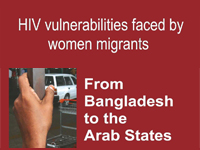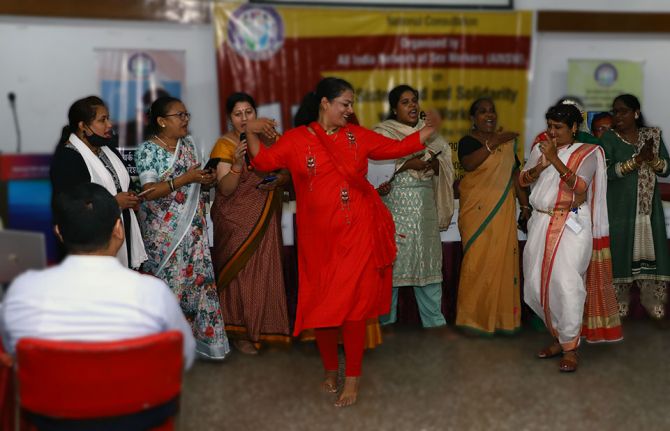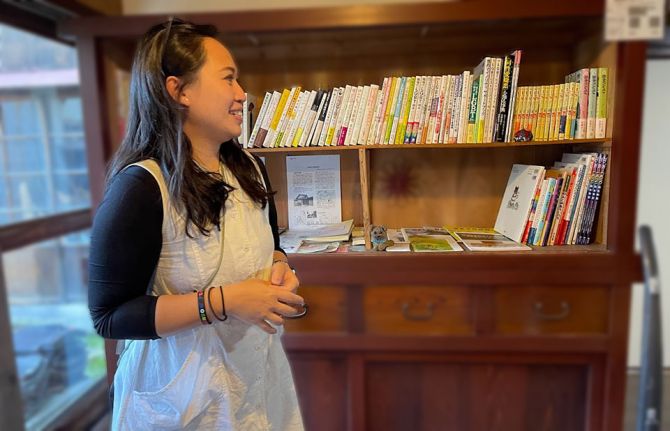
Feature Story
UNDP: Bangladeshi women migrants abroad vulnerable to HIV
27 Noviembre 2009
27 Noviembre 2009 27 Noviembre 2009
Credit: UNDP
Many Bangladeshi women migrant workers in the Arab states are subject to mandatory HIV testing and are deported if found to be living with the virus. They also often face physical and sexual abuse at the hands of their employers. These are the stark findings of a report released this week by the UN Development Programme (UNDP) and the country’s Ovibashi Karmi Unnayan Programme (OKUP).
HIV vulnerabilities faced by women migrants: from Bangladesh to the Arab States, explores the often profound health, social and economic problems experienced by many women who choose to leave their home country in search of employment, often as domestic workers.
Although migration itself is not a risk factor for HIV infection, the conditions under which some workers migrate and their living conditions in the host countries make them highly vulnerable to HIV.
Dr. Salil Panakadan, UNAIDS Country Coordinator
Migrant workers in general provide key support to Bangladesh’s economy. According to Stefan Priesner, UNDP Country Director, “The economic gains generated by migrant workers are enormous, reaching almost 9.4 % of GDP in Bangladesh in 2007.” He added, “It is, therefore, critical that good working conditions and support are provided to migrant workers throughout the migration cycle.”
The report is based on nearly 250 interviews with women migrants who shared their experiences of numerous hardships including long working hours, irregular payment of wages and physical and sexual abuse. This can lead to even greater vulnerability as women sometimes run away and find themselves open to other forms of exploitation, such as forced sex work and trafficking, clearly making them more at risk of HIV infection. Often, when they are found to be positive after involuntary testing, they are sent home.
“Although migration itself is not a risk factor for HIV infection, the conditions under which some workers migrate and their living conditions in the host countries make them highly vulnerable to HIV,” says Dr. Salil Panakadan, UNAIDS Country Coordinator. “In many cases, HIV testing in both countries of origin and host countries breaches migrants’ rights – testing is undertaken without consent, counseling, confidentiality or support.”
Shakirul Islam Lead Researcher and Chairman of OKUP also contends that vulnerability to HIV among female migrant workers is a key concern. “When analysing the unsafe conditions that Bangladeshi women face when migrating to work overseas, we found that the absence of laws and regulations in the recruitment process for migrant domestic workers and the poor working conditions they face once on site render women very vulnerable, altogether contributing to a higher risk of contracting HIV.”
He also maintains that more could be done to counter this state of affairs. “Inadequate pre-departure orientation on HIV and health vulnerabilities for departing migrants is also a big gap. Most importantly, although migrants are included in the country’s national strategic plan for AIDS, there is no national HIV response for migrant workers.”
If women migrant workers are found to be living with the virus and sent home as a result, it is argued that more needs to be done to help ensure their wellbeing. “The regional report highlights that the deportation of HIV-positive migrants by host countries and the absence of reintegration programmes in countries of origin can be devastating for the health, well-being, and livelihoods of migrants and their families,” says Caitlin Wiesen, UNDP HIV Team Leader and Regional Programme Coordinator “There is an urgent need to set up effective reintegration programmes for returning migrants and ensure their access to health services and livelihood options.”
The Arab States are the primary destination for many migrant workers from Asia, including Bangladesh. The host countries examined in the study are: Bahrain, Lebanon and UAE.
The study reveals that there is no minimum wage for Bangladeshi domestic workers either in Bahrain or in Dubai and that domestic workers in both countries are paid only around $100 a month. Such work is not covered by labour laws in either the Arab states in question or in Bangladesh itself so women migrants have no access to legal redress when abused.
“Many migrant workers….are subject to exploitation and mistreatment, and that is a worldwide problem that we are very concerned about.” says Engr. Khandaker Mosharraf Hossain, Honourable Minister for Labour, Employment, Expatriate Welfare and Overseas Employment. “Host countries and countries of origin have an equal responsibility to provide protective policies and programmes. However, progress is being made and there is more dialogue between origin and host countries which is helping us ensure that migrants’ rights are respected and protected while they are abroad.”
The Bangladesh study, forms one of the country chapters of the regional report titled: HIV vulnerabilities faced by women migrants: from Asia to the Arab states launched in March this year.
UNDP: Bangladeshi women migrants abroad vulnerabl
Cosponsors:
Feature stories:
China’s vocational schools play a key role in AIDS education (16 October 2009)
Migrant workers and HIV vulnerability in South Asian and South East Asian countries (18 May 2009)
'Never abandon, never give up’: ILO film helps China’s migrant workers challenge AIDS stigma (30 April 2009)
New report shows Asian migrant women in the Arab states have heightened vulnerability to HIV (10 March 2009)
Publications:
HIV vulnerabilities faced by women migrants: from Bangladesh to the Arab States
HIV Vulnerabilities of Migrant Women: from Asia to the Arab States
Migrants and HIV: “Far Away from Home” club
Policy Brief - HIV and International Labour Migration
Related
 Indian partners reflect on a year after sex workers’ human rights affirmed
Indian partners reflect on a year after sex workers’ human rights affirmed

05 de octubre de 2023
 A rainbow of hope for LGBTQI+ people in rural Japan
A rainbow of hope for LGBTQI+ people in rural Japan

17 de mayo de 2023

